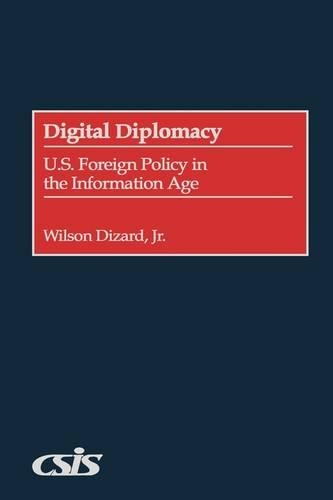
Digital Diplomacy: U.S. Foreign Policy in the Information Age
(Hardback)
Available Formats
Publishing Details
Digital Diplomacy: U.S. Foreign Policy in the Information Age
By (Author) Wilson Dizard Jr.
Bloomsbury Publishing PLC
Praeger Publishers Inc
30th April 2001
United States
Classifications
Tertiary Education
Non Fiction
Comparative law
International relations
384
Physical Properties
Hardback
232
Description
Examines the impact of the Internet and other advanced technologies on the United States foreign policy agenda and the ways in which it is managed. Digital Diplomacy provides a comprehensive overview of the major milestones in United States international communications and information policy, from the early days of the Morse telegraph to the current internet explosion. The book underlines the growing importance of the communications issues, particularly as they affect American leadership in a rapidly-changing information environment. Dizard, a former foreign service officer, rejects the idea of a computer-based "telediplomacy," arguing instead that the new technologies should be used primarily to strengthen the capabilities of American diplomats in dealling with information-age issues. A reading for those interested in the future of United States foreign policy, and a stimulating overview for scholars, researchers, and students involved in the subject.
Reviews
"More than a review of how changing communications technologies have influenced the business of diplomacy over the years, Dizard presents a disturbing picture of our continuing failure to understand, much less tap, their potential. This book can help close the gap between the accelerating digital revolution and our government's capacity to use its benefits and ward off its dangers."-Anthony Lake Distinguished Professor, School of Foreign Service Georgetown University Former National Security Advisor to the President
"The information revolution is changing the world around us in virtually every aspect of human interaction, although as Wilson Dizard points out, American diplomacy has trouble keeping up with these changes. Dizard's account of the technological changes that have impacted U.S. foreign policy in the past 50 years is a useful history for both observers and practitioners of diplomacy."-Marshall P. Adair President, American Foreign Service Association
"Wilson Dizard has done it again. As with his earlier work, Digital Diplomacy positions Dizard at the cutting edge of those writing about media, information technology, and diplomacy. This will become an indispensable book for professional diplomatic communicators and for the classroom."-Steven Livingston Associate Professor and Director, Political Communication Program The George Washington University
.,."a timely exploration of the impact of the information/technology revolution on US foreign policy. The book fills a gap in the literature on the information revolution....Recommended for upper-division undergraduates and above."-Choice
.,."especially important contribution to the literature on the strategic effects of the information revolution."-International Affairs
...a timely exploration of the impact of the information/technology revolution on US foreign policy. The book fills a gap in the literature on the information revolution....Recommended for upper-division undergraduates and above.-Choice
...especially important contribution to the literature on the strategic effects of the information revolution.-International Affairs
An informative book on what the information age means for foreign policy. Rather than settling for banalaties about a world in which knowledge crosses frontiers. Dizard rolls up his sleeves and explains the practical issues involved.-Foreign Affairs
This interesting volume considers issues that are rarely addressed in the study of United States foreign policy: it focuses on how information technologies, from the telegraph to the internet, have affected both the substance of United States foreign policy and the manner in which such policy is formulated. This is a book worth reading.-International Journal
..."a timely exploration of the impact of the information/technology revolution on US foreign policy. The book fills a gap in the literature on the information revolution....Recommended for upper-division undergraduates and above."-Choice
..."especially important contribution to the literature on the strategic effects of the information revolution."-International Affairs
"An informative book on what the information age means for foreign policy. Rather than settling for banalaties about a world in which knowledge crosses frontiers. Dizard rolls up his sleeves and explains the practical issues involved."-Foreign Affairs
"This interesting volume considers issues that are rarely addressed in the study of United States foreign policy: it focuses on how information technologies, from the telegraph to the internet, have affected both the substance of United States foreign policy and the manner in which such policy is formulated. This is a book worth reading."-International Journal
Author Bio
WILSON DIZARD, JR., is a Senior Associate in the international communications program at the Center for Strategic and International Studies in Washington. He is the author of six earlier books on media and communications.
